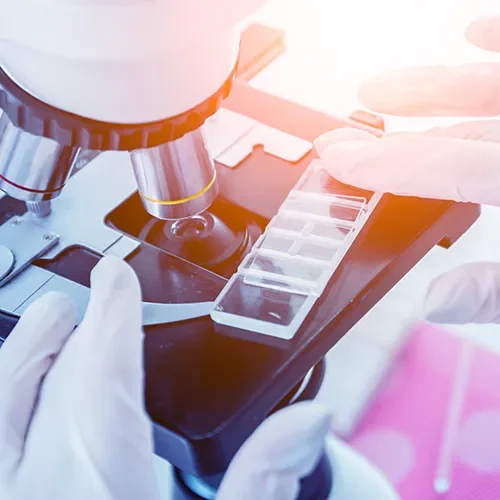Gender Selection
at Southern California Fertility Center

Complete Genetic Embryo Testing for Greater Success
Preimplantation genetic testing (PGT) involves the genetic testing of embryos before they are placed in the uterus. PGT-A, commonly used as preimplantation genetic testing for aneuploidy (formerly known as PGS), identifies abnormalities in the chromosome count of cells, such as missing or additional chromosomes, which can lead to implantation failure or miscarriages. PGT-M, though less common, is crucial for eliminating inherited diseases from a family tree. This form of testing, formerly known as PGD, screens for specific genetic disorders like inborn errors of metabolism or single-gene defects. Both PGT-A and PGT-M can be performed on the same biopsy sample using advanced nucleotide sequencing platforms managed with artificial intelligence, revolutionizing the field of IVF.
PGT-SR is a technology that can be used in couples who carry a balanced translocation and are at higher risk for recurrent pregnancy loss due to chromosomal imbalances. This technology looks at the breakpoints of the chromosome/s more precisely and closely to detect any small imbalances that could be missed in PGT-A.
PGT-P is a new technology that recently has been introduced and involves the embryo risk stratification for common moderate risk disorders like:
- Type I DM
- Type 2 diabetes
- Basal cell carcinoma
- Schizophrenia
- Malignant melanoma
- Prostate cancer
- Testicular cancer
- Heart attack
- Hypercholesterolemia
- Hypertension
- Coronary artery disease
PGT-P is designed to screen several conditions at the same time. All of the disease risks for each embryo are merged into a single number: the Embryo Health Score (EHS) and embryos are then ranked from lowest to highest risk. Although the company claims it has been validated to reduce disease incidence by up to 72% for some diseases like type I DM, however, according to ACMG expert review this test is still considered investigational. Therefore, proper and accurate genetic counseling by an independent reproductive geneticist (Not affiliated with the company) is very important to understand the indications and result interpretation
Types of PGT
PGT-A
for Aneuploidy
PGT-A screens embryos for chromosomal abnormalities. This is particularly useful for infertile couples where the female partner is older, those who have had multiple failed IVF cycles, or those who experience recurrent miscarriages. It can detect disorders like Down’s Syndrome, where there is an extra chromosome #21.
PGT-M
for Monogenic Disorders
PGT-M screens for specific genetic illnesses by identifying single-gene mutations. This test is crucial for parents who are carriers of genetic diseases such as cystic fibrosis, Huntington’s chorea, Marfan syndrome, Tay-Sachs, and Sickle Cell Anemia.
PGT-SR
for Structural Rearrangements
PGT-SR detects structural chromosome rearrangements like reciprocal translocations and inversions that can be passed from parents to children, often leading to pregnancy failure.
When is PGT Recommended?
Dr. Nastaran Foyouzi, one of the world's leading experts in genetics, recommends PGT, PGT-A, and PGT-SR in the following cases:
PGT-A
For patients with unexplained miscarriages, to electively de-select aneuploid embryos and optimize implantation attempts, identify gender in screened embryos, improve implantation in cases of compromised egg or sperm quality, and for PCOS patients undergoing elective frozen embryo transfer. PGT-A is also used to detect, Downs Syndrome, Edwards Syndrome, and Turner Syndrome.
PGT-M
For patients with inborn errors of metabolism (e.g., Tay-Sachs, Gaucher’s) or those carrying genetic markers for known diseases (e.g., cystic fibrosis, hemophilia, sickle cell anemia, muscular dystrophy).
PGT-SR
For known translocations or inversions in parents that cause miscarriages, to allow for successful implantation.
The PGT Process
Current Detectable Diseases
Dr. Nastaran Foyouzi and her team at Southern California Fertility Center in La Jolla are some of the world’s leading reproductive genetic endocrinologists and embryologists, offering advanced genetic testing to detect a wide range of genetic disorders. The following are some of the diseases that can be identified through their comprehensive preimplantation genetic testing (PGT) services:
- Adrenoleukodystrophy
- Amyotrophic Lateral Sclerosis
- Becker Muscular Dystrophy
- Beta Thalassemia
- Breast Cancer
- Central Core Disease
- Centronuclear (Myotubular) Myopathy
- Cerebellar Ataxia
- Charcot-Marie-Tooth Disease
- Chondrodysplasia Punctata
- Congenital Aganglionic Megacolon
- Conradi-Hunnerman Syndrome
- Cystic Fibrosis
- Duchenne Muscular Dystrophy
- Factor VIII Deficiency
- Factor IX Deficiency
- Familial Spastic Paraparesis
- Fragile X Syndrome
- Friedrich’s Ataxia
- Gardner Syndrome
- Glycogen Storage Disease
- Happle Syndrome
- Hemophilia
- Huntington’s Disease
- Retinitis Pigmentosa
- Prostate Cancer
- Sickle Cell Anemia
- Tay-Sachs Disease
- Von Willebrand Disease
- Many Other Diseases

The expertise of Dr. Foyouzi and her staff ensures that each genetic test is conducted with precision and care, providing patients with the most accurate and reliable results. Their commitment to cutting-edge technology and compassionate care makes Southern California Fertility Center a leader in the field of reproductive genetics.

Talk to Dr. Foyouzi about PGT for Peace of Mind
The fertility specialists at Southern California Fertility Center in La Jolla, led by Dr. Foyouzi, have extensive clinical experience with Preimplantation Genetic Testing options, including PGT-M, PGT-A, PGT-SR, PGT-P or even embryo whole genome sequencing. The initial step involves comprehensive testing and analysis to determine the indication for these options and review alternatives. Dr. Foyouzi and her team are recognized experts in the field, with numerous publications in peer-reviewed journals. They serve on editorial boards of leading journals in IVF, pharmacogenomics, artificial intelligence in IVF, and PGS.
Contact Southern California Fertility Center in La Jolla to request an initial genetic testing consultation and explore your options for PGT with Dr. Foyouzi and her dedicated team.
